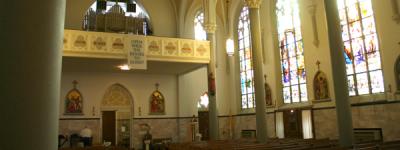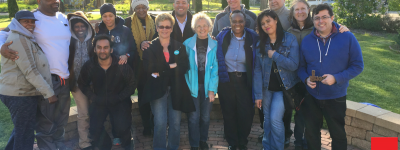By: Caitlin Morneau, Director of Restorative Justice
On a chilly morning in Chicago, a dynamic group of Catholic leaders gathered at Precious Blood Ministry of Reconciliation (PBMR) for a deeply enriching four-day Circlekeeper Training. The first of its kind that CMN has hosted, PBMR could not have been a more perfect setting. Founded to serve youth, families, and community members who are impacted by violence and the criminal justice system, PBMR grounds its ministry of reconciliation in restorative justice and peacemaking circles.
Our facilitators, Fr. David Kelly, C.PP.S. and Sr. Janet Ryan, OSF, shared accounts of healing they witnessed in circle with young people and the many ways that these learnings are transferable beyond Chicago’s Back of the Yards neighborhood. By experiencing the process, we came to understand how core components of the talking piece, centerpiece, ritual, and questions all contribute to a sacred space where transformative encounter can take place.
As a core restorative practice, "circle process" or "peacemaking circles" help participants to take time to slow down and honor one another’s innate human dignity by listening deeply, sharing openly about our experiences, and sometimes, working through harm or conflict — even in cases of crime and violence.
Fr. David reminded us of the times in Scripture, particularly on the Road to Emmaus, that Jesus’ invitation to storytelling and deep listening allowed healing and light to emerge out of suffering and darkness. Simple though it sounds, we were reminded that this way of being in relationship is counter to the fast-paced, competitive, retributive culture we often find ourselves in.
As a group, we represented a mosaic of the Church: lay people, women religious, and clergy. We came from diocesan offices, parish councils, Catholic schools, and non-profit organizations. In addition to sharing individually, shared prayer, art, movement, and singing created opportunity for deep intellectual, emotional, spiritual, and physical engagement. Through our time together, I was reminded of the great need for healing both within and outside of our Church, and these are not separate from one another, but rather interdependent.
One participant said it this way, “Circle training renewed in me my belief in the power of relationship in creating healthy, supportive spaces of community. I experienced again how Circles can be opportunities for deepening trust among persons with differing perspectives and for new seeing to flourish. Circle training strengthened my desire and ability to initiate a new way of engaging others in discernment.”
Another shared, “After many years in ministry I often don’t expect much when I go through trainings, but this circle process training was incredibly helpful and personally intense and I know it will enhance my ministry as we move forward in the sexual abuse crisis in our (arch)diocese.”
As CMN has expanded resources and formation opportunities to learn about restorative justice, including introductory experiences through Restorative Circles Intensives, the question naturally follows “how do I become trained as a circle keeper?”
This month’s training with PBMR affirmed that there is longing and infinite opportunities for Catholics to bring restorative practices into ministry to be agents of healing amidst crime and criminal justice and live more restoratively in every aspect of life.







